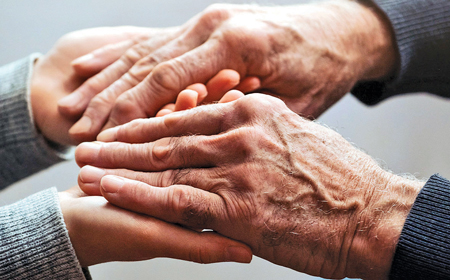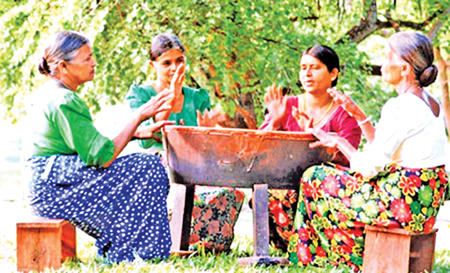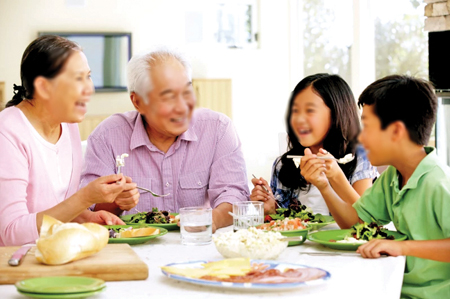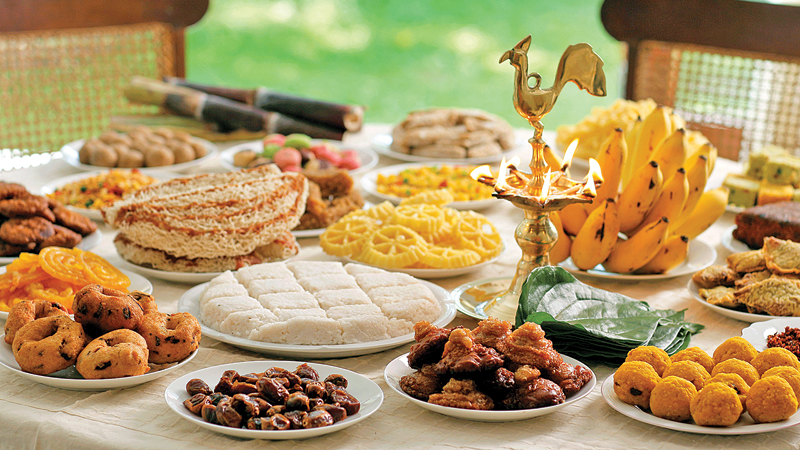It is the Avurudu season once more, filling the air with its festive spirit. For generations, April has been special to us, a great time of togetherness, where laughter and memories create a beautiful atmosphere of happiness and love. It is the ideal period of the year to cherish the splendour and richness of our cultural values and heritage. From the vibrant Avurudu rituals to mouth-watering Avurudu sweetmeats, the festival carries its unique charm. Amid celebrations, the Sinhalese and Tamils find moments of gratitude, reflection, and unity as well, the simple, yet true pleasures in life that bind us together as human beings.
 Although many of us traditionally exchange New Year cards on January 1, according to the Gregorian Calendar followed in Europe, for Tamils and Sinhalese, the New Year or Avurudu commences with the transition of the Sun from Meena Rashi (Pisces) to Mesha Rashi (Aries). Aside from New Year customs and rituals such as observing the new moon, lighting the hearth, eating meals at auspicious times, engaging in transactions, boiling milk on the hearth, and oil anointing customs, there are various New Year games that people play after the New Year’s dawn.
Although many of us traditionally exchange New Year cards on January 1, according to the Gregorian Calendar followed in Europe, for Tamils and Sinhalese, the New Year or Avurudu commences with the transition of the Sun from Meena Rashi (Pisces) to Mesha Rashi (Aries). Aside from New Year customs and rituals such as observing the new moon, lighting the hearth, eating meals at auspicious times, engaging in transactions, boiling milk on the hearth, and oil anointing customs, there are various New Year games that people play after the New Year’s dawn.
Extended family system
We are still lucky to have our extended family system intact, and having older relatives living with us is truly a blessing. They often reminisce about the authentic New Year celebrations of the past, where they could fully immerse themselves in the festivities instead of just watching them on TV or social media. While these televised events may lack the same charm, they too play a role in preserving our traditions. Our parents and grandparents fondly recount tales of running through orchards, enjoying the taste of wild fruits and nuts under the village sun.
Nature’s festival
The New Year celebration is not only a time for festivity, but also a tribute to nature itself. It honours the sun’s transition, symbolising renewal, and hope, and celebrates nature’s abundance in its full glory. From the vibrant colours of blooming Erambudu and many more flowers to the cheerful songs of Koha, the Asian koel, every aspect of nature’s beauty is embraced and celebrated during the avurudu season.
Diverse views
Most importantly, this great cultural festival transcends generations and bridges the gap between the old and the small. The writer spoke to several individuals spanning generations – from the Silent Generation to Generation Alpha- to explore their views and perspectives on Traditional Avurudu celebrations and its significance to them and gather their sentiments on the cultural celebration.
While some older people were unsure about when to have meals or light the hearth due to the controversy related to ‘Avurudu Nekath’ this year ‘, others stressed the necessity of strictly following customs, believing it to be unlucky to deviate from tradition.
Impact of Covid-19
“It’s truly disheartening that, since the Covid-19 pandemic began, I haven’t experienced a single New Year celebration to my satisfaction,” said a retired banker. Reflecting on the situation, she sadly noted the waning enthusiasm among her children and grandchildren. “We’re still not back to our usual rhythm,” she added, longing for a return to normalcy.
A retired school principal, now frail and unable to do much, spends her days doing charity work. She feels nostalgic when reminiscing about the mid-60s when she and her siblings celebrated New Year with their family. She fondly recalls the scent of new clothes and the joyous hours spent playing New Year’s games. “Our house was always filled with relatives,” she reminisced. “My father would generously distribute small gifts to those who came to offer Bulath (Betel leaves),” she added with a smile.
 She doesn’t approve of the new changes where everything is done digitally, and relatives only see each other through Zoom or digital devices. “Some of my granddaughters won’t even come to see me anymore; they’ll just talk to me through some device that my maid knows, but I don’t!” she said. “The younger generation doesn’t experience the true joy of New Year like we did years ago,’ she added sadly.
She doesn’t approve of the new changes where everything is done digitally, and relatives only see each other through Zoom or digital devices. “Some of my granddaughters won’t even come to see me anymore; they’ll just talk to me through some device that my maid knows, but I don’t!” she said. “The younger generation doesn’t experience the true joy of New Year like we did years ago,’ she added sadly.
New generation
Millennials and Gen Zers whom the writer spoke to hold a slightly different view. They believe that digital devices haven’t divided us but rather brought us closer together. “Aluth Avurudu should evolve, just as we have,” they suggest. ‘Its significance may remain the same, but new additions should be welcomed,’ they proposed. Embracing change in New Year traditions can help keep the celebrations vibrant and relevant, ensuring that they resonate with younger generations while still honoring the essence of the occasion.
In response to the Sunday Observer query as to what new additions are required to the New Year celebrations Yohan, a 30-year-old architect said more cultural events should be organised on digital platforms such as virtual gatherings and interactive online activities.
These additions can help blend traditional celebrations with modern technology, making New Year’s celebrations more inclusive, engaging, and meaningful in the digital age.
As he said, hosting such events can make the New Year’s spirit spread beyond borders, bringing people together from all around the world.
Surani, a 28-year-old Company manager shared with the Sunday Observer the importance of teaching grandparents how to celebrate New Year’s and spread love, strengthening bonds beyond borders by connecting with relatives abroad virtually. “I’ve been teaching my grandparents how to use smartphones. I wanted to convince them that there are so many opportunities available to them if they have digital literacy,’ she said. “Initially resistant to me using the phone, now that she’s familiar with YouTube, my grandma enjoys trying out New Year recipes. Anyway, no matter how well a YouTube recipe turns out, my grandma insists the taste can’t match the sweets her mother used to make!” she added with a smile.
Surani said that it is not fair to compare everything to the past. “Despite minor criticisms, my grandparents are bridging the generation gap when it comes to Avurudu celebrations and more,” she added.
Fondness for New Year traditions
 A Gen Z er shared with the writer his fondness for New Year traditions and sweetmeats, even though they may be oily. He particularly enjoys Kavum and Kokis for their delicious taste. He said that these traditional delicacies could also be utilised to promote tourism, showcasing our cultural heritage to visitors from around the world.
A Gen Z er shared with the writer his fondness for New Year traditions and sweetmeats, even though they may be oily. He particularly enjoys Kavum and Kokis for their delicious taste. He said that these traditional delicacies could also be utilised to promote tourism, showcasing our cultural heritage to visitors from around the world.
Despite criticisms from the older generation regarding the heavy commercialisation of Avurudu, with everything seemingly given a negative value, the majority of youth who spoke to the Sunday Observer expressed a different perspective. They view the increasing prominence of Avurudu in advertisements and profit-based entities as a positive trend, considering it as an effort to preserve Avurudu traditions.
“They highlight Avurudu customs through product promotion,” remarked one respondent. “It’s awesome. It’s lovely to see the efforts the young make to bring Avurudu splendour online,” he added.
This shift in perception highlights the evolving nature of cultural celebrations and the role of modern platforms in their preservation and propagation.
Feeling nostalgic
A septuagenarian, recalled his youthful days when all New Year auspicious times were printed in the Litha. “We eagerly awaited the Avurudu Litha issued by the newspaper,” he reminisced. “My wife passed away four years ago, but I still vividly remember how I used to bring her the Litha from the newspaper purchased at the little shop in the junction.”
He became emotional as he recalled his past, particularly memories of his wife flooding back, causing him to pause and struggle for words. “Both my children live abroad, but they keep in constant touch with me. I have a nephew nearby and two aides,” he added. “Nowadays, New Year doesn’t bring me happiness. I only receive a cake and a phone call from my children. I wish I could pass away before the next New Year because the memories of my wife are so intertwined with the occasion, making it unbearable,’ he lamented.
Pets and the New Year
“Years ago, people didn’t think much about how fireworks scared pets. Cats and dogs trembled while fireworks lit up the sky. But now, thanks to animal rights groups (or maybe people are kinder now) speaking up, folks are being more careful. They’re realising the importance of keeping our furry friends safe during celebrations,” a senior lecturer said.
Young people care about pets too. Almost all the youth and teens the Sunday Observer spoke to said they’re being extra careful not to light crackers because it scares animals. They want celebrations that don’t frighten our furry friends.
“We are determined to ensure that celebrations don’t come at the expense of our furry friends’ comfort,” the youngest interviewee, a 14-year-old schoolboy said.
Vegetarian food preferences
Less than 40 percent of those interviewed weren’t concerned about the type of food served on the New Year table besides sweetmeats and Kiribath (Milk Rice). The majority preferred a non-animal product spread. One standout was a 52-year-old finance analyst who shared, “Since my grandma’s time, our New Year table has been vegetarian. It’s a celebration of nature, honouring the Sun god and the harvest. In ancient times, animals assisted in farming. It’s a nature festival, so I make sure there’s no meat on our Avurudu table. Though not obligatory, it’s our tradition,” he raised concern.
Shared joy
Even the youngest members of Generation Alpha recognise the significance of this special time for reuniting and strengthening bonds, often more than understanding the auspicious timings associated with the event. While many of the older generations lament the loss of traditions, there are a few who embrace the changes with open arms, joyfully adapting to them.
Elderly people who receive attentive care from younger generations are often more willing to adapt and embrace modern changes. On the contrary, those who feel neglected or poorly cared for by the younger generation may resist such changes and express unhappiness. What’s truly needed is mutual care and support among generations—where the older generation nurtures the younger, and vice versa. Elders can impart traditional wisdom to the younger ones, while the younger generation can share their knowledge of the digital world with their elders.
With better understanding between generations, we can ensure that Avurudu traditions continue for centuries, evolving with the times while keeping their essence intact. This way, we can maintain our cultural heritage while embracing the present and the future. Thus, the core of Avurudu lies in the unity between generations with smiles on every face whether young or old.









